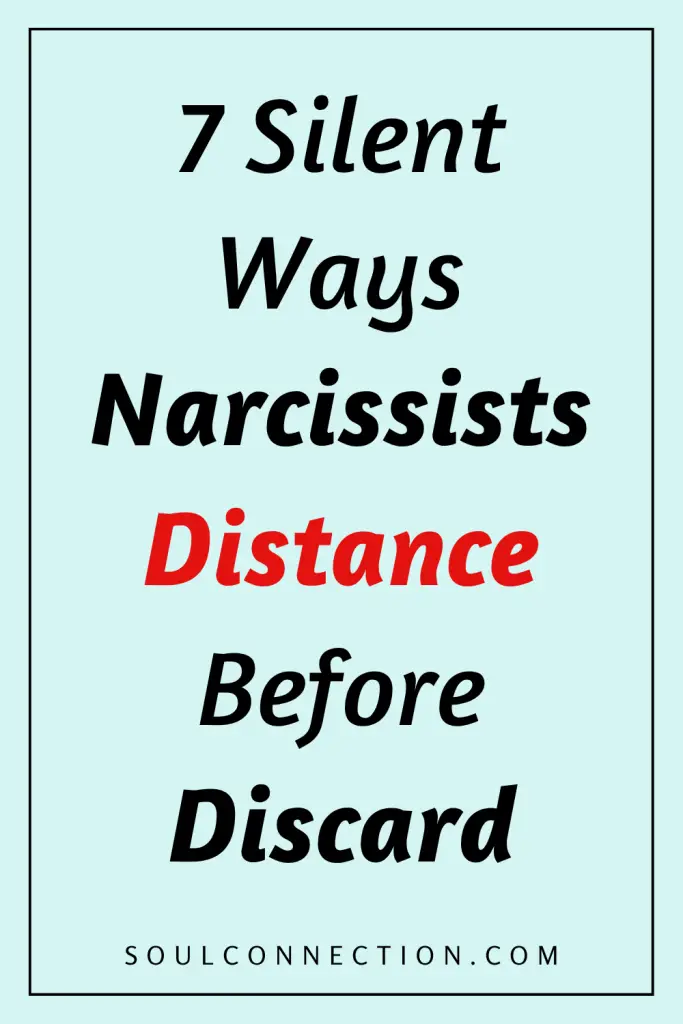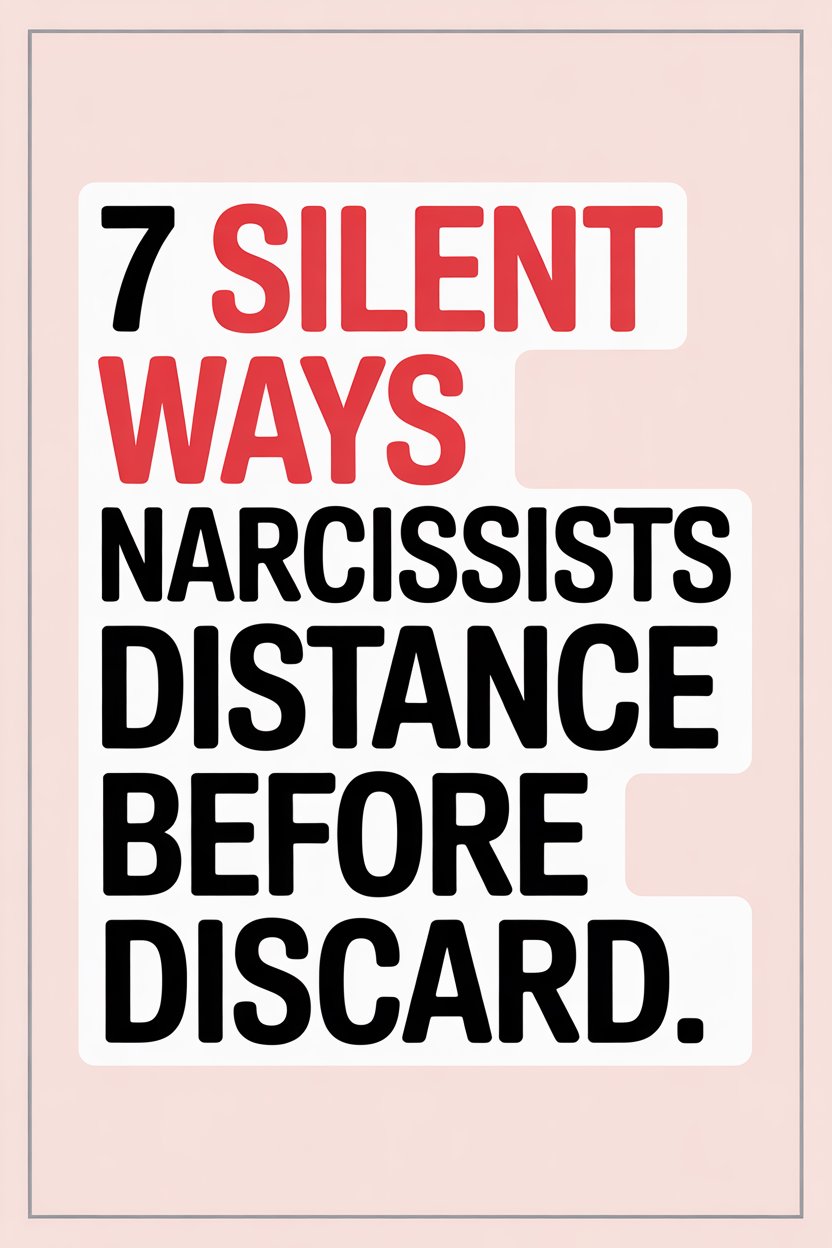Ever get the sinking feeling that someone you love has started treating you like yesterday’s leftovers?
If your partner seems to have morphed from attentive to arctic, and you’re sensing an invisible wall rising between you, you’re not imagining things. Narcissists rarely dump people out of nowhere.
No, they prefer the slow fade, the silent sabotage, the kind of distancing that leaves you questioning your sanity and googling “Is it me or are they just a jerk?” at 2 a.m.
Let’s call it for what it is: a pre-breakup performance worthy of a cheap soap opera, minus the dramatic music. Here’s how narcissists quietly start pulling away—one icy maneuver at a time.
1. Vanishing Acts Become a Daily Special
It starts out simple. Fewer texts, longer delays. That “good morning” message you once got before your feet hit the floor? Now, you’re lucky if you receive a hasty “hey” at lunchtime—if at all.
Phone calls go unanswered. Plans suddenly “slip their mind.” Work “gets busy,” their mum “needs help,” or their pet goldfish “has trust issues.” (Okay, maybe not that last one, but you get the idea.)
Meanwhile, your mind races: Did I do something wrong? Are they okay? Is their phone lost in the Bermuda Triangle?
Here’s the thing: narcissists excel at slow fades. They want to see how little they can give you while still keeping you on the hook.
The more you chase, the more they disappear behind smug excuses and the occasional ghosting.
2. The Affection Drought Arrives
Gone are the spontaneous hugs, the inside jokes, the texts making you feel like the only person on earth. Now, their affection is rationed out like they’re running a love famine.
Physical contact? Suddenly, they’ve developed a phobia of hand-holding, cuddling, or even sitting near you on the couch. (Who knew you were contagious?)
Verbal warmth takes a nosedive, too. Compliments dry up, replaced with vague mumbles or—worse—radio silence. It’s like living with a roommate who’s allergic to kindness.
Why? Because emotional coldness is a narcissist’s favorite distancing tool. It conditions you to crave their approval and sets you up to blame yourself for the sudden chill.
If only you were “good enough,” they’d warm back up—right?
3. Sarcasm and Subtle Put-Downs Sneak In
Remember when they used to laugh with you, not at you? As narcissists prepare their exit, snark creeps into their conversations like an uninvited guest.
There’s a difference between playful teasing and pointed sarcasm. Narcissists know exactly where your insecurities live—and they’re not above renting a room there.
Suddenly, your clothes, tastes, or opinions get the “just kidding” treatment, dusted with the kind of sarcasm that stings more than a bee in your sock.
These jabs wear you down, and you start questioning your own worth. That’s the plan. Diminishing your self-esteem makes it easier for them to justify bailing on the relationship—because, hey, “it just wasn’t working.”
4. Conversations Turn Into Ice-Cold Transactions
Ever try talking to a narcissist on the way out the door? You’ll get more warmth and engagement from a brick wall.
Conversations go from lively to lifeless. Deep talks get sidestepped with grunts or a disinterested “mmhmm.”
Sometimes, you’ll notice their eyes glazing over, like you’re reciting the instructions for assembling flat-pack furniture.
Requests for support or understanding? Good luck. Suddenly, they’re too tired, distracted, or “just not in the mood to talk about feelings right now.”
This emotional shutdown makes you feel isolated and needy. It’s engineered that way, so you stop reaching out and they can quietly unplug from the connection, guilt-free.
5. Sudden Spikes in Secretiveness and Privacy
Ever feel like your partner has joined a secret society? Passwords change, phones cling to them like a lifeline, and any attempt to ask about their day is met with vague answers or defensive outbursts.
Narcissists often become cagey when preparing to discard someone. More late nights, mysterious “work meetings,” and friends you’ve never heard of suddenly fill the calendar.
You’re told you’re “paranoid” or “too controlling” for noticing, but your gut knows otherwise. This secrecy isn’t about privacy—it’s about setting the stage for a life that no longer includes you, usually with a backup player waiting in the wings.
6. Picking Fights Over Absolutely Nothing
Remember those sitcoms where characters invent wild reasons to avoid responsibility? Narcissists do that, but the joke is on you.
Minor issues become major blowups. You left a glass in the sink? Suddenly, you’re “disrespecting the entire household.” Your choice of movie? Obviously, it’s a sign you’re “not compatible.”
If the cat looks at them funny, it’s somehow your fault, too.
These manufactured conflicts serve a purpose. They create distance, keep you off balance, and—if you push back—give them ammunition to say you’re “impossible to live with.”
They’re building a case for their grand exit, one petty argument at a time.
7. Idolizing Others and Comparing You Unfavorably
Narcissists love an audience, and they especially love proving they could do better. Enter: the comparison game.
New people are suddenly “so interesting,” “so talented,” or “so supportive”—all the things, apparently, you’re not. Workmates, exes, strangers in the checkout line; everyone seems to get their admiration except you.
You’re left wondering if you’ve become invisible, or worse, a placeholder until someone “better” comes along.
Spoiler: this isn’t about anyone being genuinely superior. It’s about making you feel inadequate, so you start withdrawing yourself—saving them the trouble of doing the dirty work.
When the Silent Treatment Gets Deafening
Watching a narcissist distance themselves is like sitting front-row for a masterclass in emotional withdrawal. It’s confusing, painful, and, frankly, enough to make anyone doubt their own reality.
Spotting these silent strategies doesn’t mean you’re doomed to be cast aside with yesterday’s laundry.
Recognizing the patterns is the first step to taking back your power—no more jumping through invisible hoops or blaming yourself for their icy behavior.
Tired of walking on eggshells? Set your own boundaries. Speak up for your needs, even if it feels awkward at first.
If you’re being shut out, consider how much you’re willing to tolerate before you put your own happiness first.
Sure, narcissists are champions at the silent fade, but you don’t have to play the supporting role in their drama. You deserve a partner who communicates, not one who vanishes behind mind games and emotional acrobatics.
Here’s the truth: healthy relationships don’t require deciphering riddles or surviving affection droughts. They require two people who show up, stay present, and fight fair—even when things get tough.
And if you’re stuck waiting for a narcissist to “come back” or “snap out of it,” remember: you’re not a backup plan or a consolation prize.
You’re the main event. Don’t let anyone convince you otherwise.


